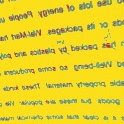hear ye hear ye
This article in the local paper, the
Southern Illinoisan, shows a couple of things besides a dubious implication that the west side of Carbondale is falling into economic malaise. Being a west-sider, I was curious to read whatever they chose to imply, but, following the advice of the person who pointed out the article to me, I read the comments and discovered that:
-comments of these news articles are very widely-used venues for public discussion of issues, in this case apparently unrelated to the story at hand. In other words, at least two people got tired of fighting on a site
where their comments were being edited out too quickly and moved over to this article, where they thought they could argue about the Peace Coalition, in the site of an article that was about the economics of the west side.
-the comments
are being edited vigorously and constantly; there are fewer now than when I first looked, and the proof of the above may be entirely gone before you look at the link. Furthermore, my guess, by the look of it, is that they are more likely to be edited if somebody (anybody) objects to them; and that this (objection) has become a tool in various wars of words over the issues involved. Thus the page itself is not only a free speech forum (in a limited way) but also a battleground for control over what remains and is read on the site permanently. Editors are clearly not averse to removing enough comments so that what remains is no longer clear or coherent, or at least frequently has unexplained gaps; one cannot tell what someone is responding to or referring to, but perhaps that's because the referent has been removed, and now the entire comments section reads like a cut-and-paste random collection of incomprehensible but clearly antagonistic remarks.
-does this forum experience change the dialogue in a region, as the
SI is really our own and only regional newspaper? Not sure, but I can assure you, it has a different look, a different tone, and a different vitality than the ink-and-newsprint newspaper itself.
-i do not see a whole lot of "pimp my blog" here- people are not commenting to get attention, or drum up business for their own site- which I know is something that some comment sections have and even encourage. Comments themselves have taken on their own character, their own culture, and are different in different places, particularly in heavily-read blogs, amongst bloggers themselves, or at least in comments sections where each signature leads to another blog.
It is encouraging that people are reading in their free time; using the web to discuss, argue, and negotiate; actively using writing informally yet strongly and purposefully, even if what one often sees is choppy, short, unclearly referenced (perhaps through no fault of the writer's)- if not relevant to the community, or to the argument at hand.
Labels: internet, personal, weblogs, writing
084 in the rearview mirror
Our writing curriculum is interesting in that it tried to separate us from the contrived formats of cause-effect, classification, and similar essays and focus the upper levels more on summary-response,quantitative writing and argument. One result of doing a lot of summary-response is that the teacher has to read a lot of the articles, and if students each have their own research topics, a single research paper for each student will require a lot of reading on the part of the teacher. I'm proud to say, looking back, that I've read a lot of articles about various topics, this term about alternatives to oil & the oil crisis such as hydrogen vehicles, natural gas, higher public transportation ridership, etc., and population crises caused by gender imbalance, in places such as China and India. You can read them all
here where you'll find students' work by clicking on their names in the template.
The writing curriculum was started fourteen years ago, and has survived a number of changes around it; I realize that it's partly my own stubbornness that has preserved the research paper, the heavy volume of summary, in other words the sheer weight of the venture. In fact I've more than doubled the workload, by teaching students how to put it all on blogs, link and format it, and insisting that what is published should be proofread, corrected, checked for plagiarism, etc., above and beyond the paper versions that are neatly indented and pretty as well. The blogs in essence show term after term of hard work of class after class of students, sources carefully linked, essays formatted and thrown on the virtual table as any portfolio that would show a student's best work, best foot forward, except that, a couple of years ago a single student accidentally deleted an entire blog, wiping out connections to many terms worth of good hard work. I've become attached to the blogs, because I know people read them, and they make a difference: there are so many reasons that good hard work can and should be public, be read and commented upon, and be stored in a permanent place where it can be accessed later. But that's another lecture. The problem here and now is that the high-level writing teacher may be unable to take several hours of grading home every night- last term I taught two other classes, eighteen summer hours, preparing and copying alone taking most of my eight-hour workday, grading summaries at home nights, and it translated into eleven and twelve-hour days which, over long & sleepless weeks was simply unsustainable, given the pressures of life and home. Something has to give; ironically, I've found it hard to let go of anything. The grading? the writing itself? The blogs (I gave up my own, this, for a while, and that was hard enough)? The line-editing? Material development? (I detest recycling exams, which students have generally seen)...
The weather here has been stunningly beautiful, mild and temperate, with new students arriving, and everyone hopeful, refreshed, optimistic, the academic world looking its best, best foot forward, so to speak. I myself got a little break, three days, took them at the beach, came back to a similar writing assignment (the quantitative reports- a level below the research papers), and am looking forward to somehow answering the query above. Interestingly, the students, who had a similar overload of class hours, became quite adept at teaching
each other such things as topic sentence, thesis statement, lunch-hour core-textbook printing 101, blog-edit, publish, link & italicize; the proof is in their work. Their basic grammar, as witnessed on midterms and finals, is nonetheless quite weak; I've concluded that they don't do as much homework anymore in the lower levels, or copy each other's whenever possible; they have to, and they have to study TOEFL also, whether they're ready or not, and there are a number of consequences to this also. Whatever adjustment I make would have to account for their needs, and the skills & abilities they'll need to survive where they're going- but this tends to make me want to stick with the line-editing (often the first thing other teachers give up)- as it seems, when I do it, to be quenching a strong thirst, in comparison to the topic sentence/thesis statement form-oriented writing-fodder material, which seems more to be like dust in the wind, somewhat pointless under the circumstances, to them the one thing they can, and do, learn elsewhere. It's an interesting dilemma, one that chat may in fact help me solve. Chat, and
pop art, done between bites of lunchtime sandwiches, but not yet effectively restoring a static web gone to seed & weed; forgive, please, the ramble and rant, soon to be buried of course, as are plant roots by coffee grounds, the steady trickle of water like the memory of free-time activities such as bicycle repair, enough sleep or a trip to the museum. Cheers, and here's to the new term, 085.




















































